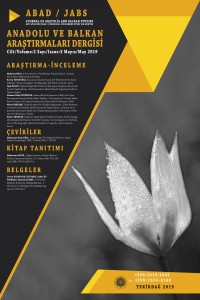Öz
Arnavutluk 1912'de Osmanlı İmparatorluğu'ndan
bağımsızlığı ilanından sonra bireylerin özgürlük ve haklarını garanti altına
alan bir devleti oluşturmak için büyük bir sorunla karşı karşıydı. Bu makale, sosyo-tarihsel analiz yoluyla,
Arnavutların bağımsızlık ilanından sonraki ilişkilerini analiz etmeyi
amaçlamaktadır. Bu dönem, devrimleri, krallığı ve komünizmi deneyimleyen birçok
siyasi değişim ile karakterize edilir. Arnavutluk her zaman yabancı bir
yönetime tabi tutuldu ve devlet liderliği yönünde politik bir bireysellik
geliştiremedi. Mevcut çalışma, bireylerin
siyasi hayata katılımının yüksek politik elit tarafından sürekli olarak
engellenmesinin; kendi hukuki görev ve sorumluluklarının bilincinde olan bir
politik öznenin gelişememesinin temel sebebi olduğu hipotezinin soruşturulması
amacıyla tasarlanmıştır.
Anahtar Kelimeler
Kaynakça
- Bibliography:BooksRaymond Aron,Opiumi i Intelektualëve, Tiranë, Dituria, 2005.Butka Uran, Kthimi i Mid'hat Frashërit, Tiranë, Pheonix, CEU & Shtëpia e Librit, 1997.Giddens Anthony, Sociologjia, Tiranë, Çabej, 2007.Vlora Eqerem bej: Kujtime 1885-1925, Shtëpia e librit & Komunikimit, Tiranë, 2003.Dahrendorf Ralf, Konflikti Shoqëror Modern, Tiranë, Dituria, 1997.Zavalani Tajar, Histori e Shqipnisë, Tiranë, Phoenix, CEU & Shëpia e librit, 1998.Feraj Hysamedin, Skicë e mendimit politik Shqiptar, Logos-A, 2010.Machiavelli Niccolo, Princi, Politika dhe Kodi Moral, Tiranë, Uegen, 2003.Tarifa Fatos, Kërkimi i Legjitimitetit dhe Venitja e Utopisë, Tiranë, UET Press, 2008.Feraj Hysamedin, E Pafilozofuara, Tiranë , Zenit Editions, 2011.
- Journals:Mërtiri Ergys, Shenja, Logos-A, Shkup, Nr 16, Gusht 2012.
- Sitography:
- Revista Drini, Kristo Frasheri mbi Qeverine e Nolit ,Tirana, 2013.Taken from: http://www.revistadrini.com/2012/04/kristo-frasheri-qeveria-e-nolit-e-deshtuar-zogu-pati-ligje-osmane/ Last access date: (05/07/2013)
Öz
After
the declaration of independence from the Ottoman Empire in 1912, Albania faces
the big problem of the formation of a state with relevant institutions that
would guarantee the freedoms and rights of individuals. This paper, through
socio-historical analysis, aims to analyze the relationship of Albanians with
after the declaration of independence. This period is characterized by numerous
political changes experiencing revolutions, kingdom and, communism.
Albania
has always been under foreign rule and has not been able to develop a political
individuality in the direction of state leadership. This paper raises the main
thesis that exactly this continuation of the deprivation of the individuals by
the high political power elite continued in the communist period, which seems
to be the main cause of the lack of development of a political individual that
understands the duties and responsibilities pertaining to lawmakers.
Anahtar Kelimeler
Kaynakça
- Bibliography:BooksRaymond Aron,Opiumi i Intelektualëve, Tiranë, Dituria, 2005.Butka Uran, Kthimi i Mid'hat Frashërit, Tiranë, Pheonix, CEU & Shtëpia e Librit, 1997.Giddens Anthony, Sociologjia, Tiranë, Çabej, 2007.Vlora Eqerem bej: Kujtime 1885-1925, Shtëpia e librit & Komunikimit, Tiranë, 2003.Dahrendorf Ralf, Konflikti Shoqëror Modern, Tiranë, Dituria, 1997.Zavalani Tajar, Histori e Shqipnisë, Tiranë, Phoenix, CEU & Shëpia e librit, 1998.Feraj Hysamedin, Skicë e mendimit politik Shqiptar, Logos-A, 2010.Machiavelli Niccolo, Princi, Politika dhe Kodi Moral, Tiranë, Uegen, 2003.Tarifa Fatos, Kërkimi i Legjitimitetit dhe Venitja e Utopisë, Tiranë, UET Press, 2008.Feraj Hysamedin, E Pafilozofuara, Tiranë , Zenit Editions, 2011.
- Journals:Mërtiri Ergys, Shenja, Logos-A, Shkup, Nr 16, Gusht 2012.
- Sitography:
- Revista Drini, Kristo Frasheri mbi Qeverine e Nolit ,Tirana, 2013.Taken from: http://www.revistadrini.com/2012/04/kristo-frasheri-qeveria-e-nolit-e-deshtuar-zogu-pati-ligje-osmane/ Last access date: (05/07/2013)
Ayrıntılar
| Birincil Dil | İngilizce |
|---|---|
| Bölüm | Makaleler |
| Yazarlar | |
| Yayımlanma Tarihi | 24 Mayıs 2019 |
| Gönderilme Tarihi | 30 Ağustos 2018 |
| Kabul Tarihi | 11 Mart 2019 |
| Yayımlandığı Sayı | Yıl 2019 Cilt: 2 Sayı: 3 |


